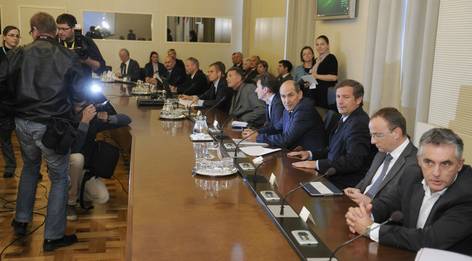NEWS
Prime Minister of the Republic of Slovenia, Janez Janša, at the session of the Economic and Social Council: "The Government will always take time to discuss important issues"
At today's session of the Economic and Social Council to which the Slovenian Prime Minister, Janez Janša, invited the Presidents of the Coalition Parties and heads of the Deputy Groups of the Coalition Parties in addition to the members of the Economic and Social Council, he opened the session by highlighting the importance of social dialogue at the time of deciding on our joint future. "Social dialogue is a value to which we are committed," said the Prime Minister, drawing the attention of all those gathered in a social dialogue that if it would not be possible to realise all the five measures for stabilisation of the situation in the state, which were proposed by the Government, new negotiations should be held. And in that case, not the social partners but the representatives of those institutions whom we will be forced to ask for the international financial aid, will be sitting at the negotiating table. Prime Minister Janša recalled many positive experiences from negotiations with social partners when entering the Eurozone as well as the year of 1991, when, similarly to today's situation, it depended on us alone whether we would succeed or not, and we did at that time. "Examples from the history are needed for the awareness of sovereignty and in 1991 the same issue was in question as it is today. One is sovereign as long as one is able to pay off his debts; once the borrower cannot pay off his debts, the lender is the one who decides," emphasised Prime Minister Janša.
Then he briefly presented the current situation in Slovenia to social partners, observing that in the last three years the debt doubled, which was the reason why we are in a bad position. He noted that it was no wonder why people asked where were eight million Euros that we borrowed and why there is poverty. The Prime Minister touched on the international situation where the prospects were not very good, too, and mentioned the expected worsening of the situation in the Middle East, an increase in petroleum products prices and consequently, a rise in the cost of living. The Eurozone is quickly responding with its numerous mechanisms; however, some will take time to create a strong Euro system.
The Prime Minister went on to describe the five key measures which are of significant importance in order to avoid a request for international financial aid. As the first measure he mentioned the fiscal consolidation, also including the incorporation of the golden fiscal rule into the Slovenian Constitution, which would improve the fiscal situation. The second measure was a rehabilitation of the banking sector, without which no positive economy growth could be expected. The third measure was the regulation of the state-owned assets through the proposed Slovenian Sovereign Holding which would regulate today's chaos in which the state looked like a state without a master. As the fourth measure the Prime Minister listed disburdening of the pension system and regulation of the situation in this area, which would provide regular pension payments and stop the drop in pensions. And the fifth measure he said it was a reform of a labour market to achieve flexicurity, which is a key factor for all foreign investments and new jobs. "If all the five measures are implemented and realised at the same time, we will have an opportunity to recover quickly since we will be able to finance our debt normally," emphasised the Slovenian Prime Minister adding that in the event we did not carry out these five measures, a part of our sovereignty would be at risk because we would have to accept conditions set by others. "We will have to follow those rules to be able to pay off the borrowed money," observed Prime Minister Janša noting that the international financial aid was not a gift but a loan increasing the public debt. The Prime Minister explained that in such an event, all the measures which were currently being blocked would have to be taken, including the golden fiscal rule and draconian cuts in the budget, and in such a scenario, the financing from the European funds and our Eurozone membership would also be at risk.
At the close of his address, Prime Minister Janša said that opposing the measures was not pulling down this Government but "killing" a social dialogue and posing a threat to the economic and social situation of all the citizens of Slovenia. "Anything that we do in these days has a decisive impact on our situation. We are deciding whether, in the next year, we will still be an independent political subject and masters on our own land or this power will be limited," observed the Slovenian Prime Minister and added that his Government would, irrespective of all separations and different views, remain committed to social dialogue and would never suspend it. "The Government will always take time to discuss important issues," emphasised Prime Minister Janez Janša.





